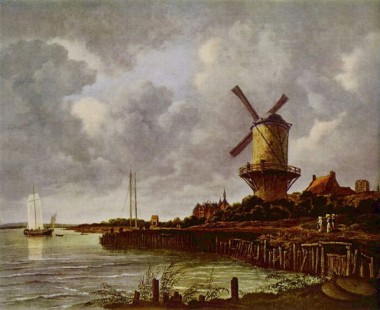ON EVIL HABITS
“The wicked man, when he is come into the depth of sins contemneth.”
cf Proverbs 18:3
The evil inclination to sin is one of the greatest injuries which we have received from the sin of Adam. This made the apostle weep when he saw himself impelled by concupiscence to the very evil which he abhorred. “I see another law in my members…captivating me in the law of sin” (Romans 7:23). Hence it is so difficult for us, who are drawn to evil by this concupiscence and by so many enemies, to reach, without sin, the land of bliss. What  would you say of a traveler who, being obliged to cross an agitated sea in a shattered vessel, would load the ship with a burden which, even in a calm sea, would be sufficient to sink the vessel? What hopes could you entertain of the safety of such a man? Now, we may say the same of the man who has contracted an evil habit: he must pass the sea of this life (a sea always tempestuous, in which so many perish) in the weak and shattered vessel of the flesh, to which we are united: and he overloads this vessel with sins of habit. It is very difficult for such a man to save his soul; because a bad habit blinds the understanding, hardens the heart, and thus makes the sinner obstinate till death.
would you say of a traveler who, being obliged to cross an agitated sea in a shattered vessel, would load the ship with a burden which, even in a calm sea, would be sufficient to sink the vessel? What hopes could you entertain of the safety of such a man? Now, we may say the same of the man who has contracted an evil habit: he must pass the sea of this life (a sea always tempestuous, in which so many perish) in the weak and shattered vessel of the flesh, to which we are united: and he overloads this vessel with sins of habit. It is very difficult for such a man to save his soul; because a bad habit blinds the understanding, hardens the heart, and thus makes the sinner obstinate till death.
First, a bad habit blinds the understanding. Why do the saints always implore light from God, and tremble lest they should become the greatest sinners in the world? Because they know that if they lose God’s light, they may commit the greatest crimes. How does it happen that so many Christians live obstinately in sin until they are lost in the end? “Their own malice blinded them” (Wisdom 2:21). Sin blinds them, and thus they are lost. Every sin produces blindness; the more sins are multiplied, the greater the blindness they produce. God is our light; and therefore, the farther the soul is removed from God, the more blind she becomes. “His bones,” says Job, “shall be filled with the vices of his youth” (cf Job 20:11). As the light of the sun cannot enter a vessel filled with clay, so a heart replete with vices cannot admit the light of God. Hence we see certain sinners lose the divine light, so that they go on from sin to sin without ever thinking of repentance. “The wicked walk round about” (Psalm 12:9). Fallen into the dark pit of sin, they do nothing but commit sins, they speak only of sins, they think only of sinning, and scarcely feel any longer that sin is an evil. “Ipsa consuetudo mali,” says St. Augustine, “non sinit peccatores videre malum quod faciunt.” The very habit of sin does not allow them to see the evil which they do. Hence they live as if they no longer believed in the existence of God, of heaven, hell, or eternity.
And behold, after an evil habit is contracted, the sins which before excited horror, are now viewed with indifference. “Make them,” says David, “like a wheel, and as stubble before the wind” (cf Psalm 83:14). See, says Gregory, how a straw is blown about by every breath of air. In like manner a person, before he falls into sin, resists and combats temptations, at least for some time; but, after having contracted a bad habit, he yields instantly to every temptation, and falls in every occasion of sin; and why? Because the habit of sin has deprived him of light. St. Anselm says, that the devil acts towards certain sinners like a person who fastens a cord to a bird; he allows it to fly away, but whenever he pleases, draws it back to the earth. These are according to the saint, habitual sinners. “Pravo usu irretiti ab hoste tenentur, volantes in eadem vitia dejiciuntur” (Ap. Edinor., in vita, lib. ii.). St. Bernardine says (tom. iv. serm. xv.) that some continue to commit sin, without being exposed to any dangerous occasion. He compares habitual  sinners to the wings of a windmill, which are driven round by every wind, and turn the mill even when there is no corn to be ground, and against the will of the master. You shall find habitual sinners, who indulge in bad thoughts even without any occasion to excite them, without pleasure, and drawn into them as it were involuntarily and forcibly, by the effects of evil habits. “Dura res est consuetudo,” says St. John Chrysostom, “quae nonnunquam nolentes committere cogit illicita.” Yes, as St. Augustine says, a bad habit brings on a certain necessity. “Dum consuetudini non resistitur, facta est necessitas.” And according to St. Bernardine, evil habits are changed into our nature. “Usus vertitur in naturam.” Hence, as it is necessary for a man to breathe, so it appears that habitual sinners become the slaves of sin, and bring themselves into a necessity of falling into sin. I have said that they becomes slaves of sin. There are servants, who serve for wages, and slaves, who serve by force and without remuneration. To these we may compare certain miserable men, who sin even without pleasure.
sinners to the wings of a windmill, which are driven round by every wind, and turn the mill even when there is no corn to be ground, and against the will of the master. You shall find habitual sinners, who indulge in bad thoughts even without any occasion to excite them, without pleasure, and drawn into them as it were involuntarily and forcibly, by the effects of evil habits. “Dura res est consuetudo,” says St. John Chrysostom, “quae nonnunquam nolentes committere cogit illicita.” Yes, as St. Augustine says, a bad habit brings on a certain necessity. “Dum consuetudini non resistitur, facta est necessitas.” And according to St. Bernardine, evil habits are changed into our nature. “Usus vertitur in naturam.” Hence, as it is necessary for a man to breathe, so it appears that habitual sinners become the slaves of sin, and bring themselves into a necessity of falling into sin. I have said that they becomes slaves of sin. There are servants, who serve for wages, and slaves, who serve by force and without remuneration. To these we may compare certain miserable men, who sin even without pleasure.
“The wicked man, when he is come into the depth of sins, contemneth” (cf Proverbs 18:3). This passage St. Chrysostom explains of habitual sinners, who, sunk in an abyss of darkness, despise corrections, sermons, censures, hell, and God; they despise everything, and resemble the vulture, which waits to be killed by the fowler, rather than abandon the dead body on which it feeds. Father Recupito relates that a man condemned to death, even when going to the place of execution, raised his eyes, saw a young female, and consented to a bad thought. Father Gisolfo relates that a blasphemer, who had been likewise condemned to death, when thrown off the scaffold, broke out into a blasphemy. St. Bernard goes so far as to say that it is almost useless to pray for habitual sinners–that we must weep over them as lost forever. If they no longer see their danger, how can they escape the precipice? To preserve them from it, a miracle of grace is necessary. The miserable wretches shall open their eyes in hell, when the sight of their misery shall serve only to make them weep more bitterly over their folly.
Affections and Prayers
My God, thou hast bestowed more favors on me than on others, and I have done greater injuries to thee than any person whom I know. O sorrowful heart of my Redeemer, so much afflicted and tortured on the cross at the sight of my sins, give me through thy merits a lively sense of my faults, and a lively sorrow for them. Ah, my Jesus, I am full of vices, but thou art omnipotent; thou canst easily fill my soul with thy holy love. I therefore hope in thee, who art infinite goodness and infinite mercy. I repent, O Sovereign Good, of having offended thee. O that I had died rather than have ever offended thee! I have forgotten thee; but thou hast not forgotten me: this I see with the light which thou now givest me. Since, then, thou gavest me this light, give me also strength to be faithful to thee. I promise to die a thousand times rather than ever turn my back upon thee. But in thy aid I place my hopes. “In thee, O Lord, I have hoped; let me never be confounded.” I hope, O my Jesus, in thee, that I shall nevermore see myself confounded in sin, and deprived of thy grace. To thee also, O Mary, my mistress, I turn. In thee, O Lady, I have hoped; let me not be confounded forever. O my hope, I trust in thy intercession, that I shall never again see myself the enemy of thy Son. Ah, beg of him to strike me dead rather than abandon me to this sovereign misfortune.
Editor’s Note: This meditation is from St. Alphonsus Liguori’s “Preparation for Death” (1758).




